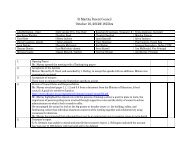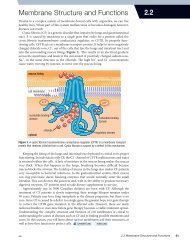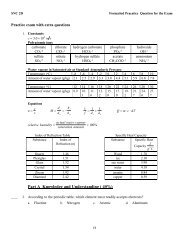Memo 2009 B7 - Revised Pupil Accommodation Review Guideline
Memo 2009 B7 - Revised Pupil Accommodation Review Guideline
Memo 2009 B7 - Revised Pupil Accommodation Review Guideline
You also want an ePaper? Increase the reach of your titles
YUMPU automatically turns print PDFs into web optimized ePapers that Google loves.
Ministry of Education<br />
Ministère de l’Éducation<br />
Office of the ADM<br />
Bureau du sous-ministre adjoint<br />
Business & Finance Division Division des opérations et des finances<br />
20th Floor, Mowat Block 20 e étage, Édifice Mowat<br />
900 Bay Street 900, rue Bay<br />
Toronto ON M7A 1L2 Toronto ON M7A 1L2<br />
<strong>2009</strong>:<strong>B7</strong><br />
MEMORANDUM TO:<br />
FROM:<br />
Directors of Education<br />
Nancy Naylor<br />
Assistant Deputy Minister<br />
Business and Finance Division<br />
DATE: June 26, <strong>2009</strong><br />
SUBJECT:<br />
<strong>Revised</strong> <strong>Pupil</strong> <strong>Accommodation</strong> <strong>Review</strong> <strong>Guideline</strong><br />
In the past year, school boards across the province have successfully completed<br />
accommodation reviews based on the <strong>Pupil</strong> <strong>Accommodation</strong> <strong>Review</strong> <strong>Guideline</strong> released<br />
in <strong>Memo</strong>randum 2006:B12. The Ministry commends boards for undertaking these<br />
consultation processes that are critical to decision-making about the future of your<br />
schools.<br />
<strong>Accommodation</strong> decisions can be some of the most difficult faced by school boards and<br />
they are best made at the local level with meaningful involvement of the local<br />
community.<br />
Based on these accommodation review processes, the Ministry has received hundreds<br />
of comments directly and through the media from school boards, parents, community<br />
members and Ministry-appointed independent facilitators. We also reviewed reports from<br />
other stakeholders and the report of the Declining Enrolment Working Group, Planning<br />
and Possibilities, which recommended that the Ministry review the <strong>Pupil</strong> <strong>Accommodation</strong><br />
<strong>Review</strong> <strong>Guideline</strong>.<br />
As a result of the feedback, it is clear that the original <strong>Pupil</strong> <strong>Accommodation</strong> <strong>Review</strong><br />
<strong>Guideline</strong> supports that principle by strengthening consultation and decision-making<br />
processes at school boards. The <strong>Accommodation</strong> <strong>Review</strong> Committee (ARC) process<br />
has supported improved transparency of decision-making, constructive discussions<br />
among the board and the public, meaningful community engagement, and outcomes that<br />
will benefit current and future students.<br />
The feedback identified several areas where the <strong>Pupil</strong> <strong>Accommodation</strong> <strong>Review</strong> <strong>Guideline</strong><br />
could be strengthened to better support the ARC process. The Ministry has made<br />
several revisions to the <strong>Guideline</strong> as a result.<br />
<strong>Revised</strong> <strong>Pupil</strong> <strong>Accommodation</strong> <strong>Review</strong> <strong>Guideline</strong> Page 1 of 4<br />
<strong>Memo</strong>randum <strong>2009</strong>:<strong>B7</strong> from Nancy Naylor June 26, <strong>2009</strong>
Highlights of Revisions to the <strong>Pupil</strong> <strong>Accommodation</strong> <strong>Review</strong> <strong>Guideline</strong>:<br />
• The reduction from 60 days to 30 days for the minimum period between the<br />
announcement of an ARC and the first of four public meetings. ARCs can begin<br />
to prepare for their work during this 30 day period.<br />
• The addition of a reference to board long-term enrolment and capital planning,<br />
including the potential for partnerships.<br />
• The introduction of a Terms of Reference designed to clarify the mandate of the<br />
ARC; the parameters and Reference Criteria that will guide the development and<br />
recommendation of accommodation options; the roles and responsibilities of<br />
ARC members; and the ARC process.<br />
• The modification of the “valuation tool” to reflect a process that better supports<br />
the review of existing schools and the evaluation of accommodation options. The<br />
modified “School Information Profile” is intended to ensure the ARC and the<br />
public are well-informed about all schools under review based on their value to<br />
students, the school board, the community and the local economy. This process<br />
will ensure that the ARC is well-positioned to make accommodation<br />
recommendations to the board based on a full understanding of the schools and<br />
their relationship to the local communities.<br />
• Improved clarity regarding the ARC’s role in making accommodation<br />
recommendations to the board and the presentation of those recommendations<br />
in an <strong>Accommodation</strong> Report to the board.<br />
• Other clarifications to better reflect policy intentions.<br />
We received many questions and comments regarding the role of trustees in the ARC<br />
process. We note in the revised <strong>Guideline</strong> that trustees are not required to serve on<br />
ARCs. This remains a board decision, but based on existing practice, many boards find it<br />
is more consistent with trustees’ corporate decision-making responsibility for trustees to<br />
not sit on ARCs.<br />
The Reference Criteria are an important tool for boards, ARCs and the public. The<br />
criteria – outlined in the Terms of Reference – are intended to improve transparency<br />
about accommodation decision-making by ensuring that ARCs and the public consider<br />
accommodation options that fit within the educational and accommodation policies of the<br />
school board. Examples of Reference Criteria are: grade configuration, programming<br />
objectives, transportation policies, and school utilization. It is up to boards to determine<br />
the level of detail they wish to include in the Reference Criteria.<br />
You will note that the underlying principles and processes of the <strong>Guideline</strong> remain the<br />
same and that boards still have considerable discretion about the details of their own<br />
accommodation policies. Please also note that there are no revisions to the<br />
Administrative <strong>Review</strong> process.<br />
Successful Practices<br />
Some constructive feedback was not incorporated into the <strong>Guideline</strong> because the<br />
Ministry recognizes that what may work successfully at some boards may not be as<br />
successful at other boards. The Ministry believes that sharing experiences among<br />
boards is a useful way to strengthen policies and practices regarding the<br />
accommodation review process. The Ministry will work with the Ontario Association of<br />
School Business Officials to create a forum for boards to share successful practices.<br />
<strong>Revised</strong> <strong>Pupil</strong> <strong>Accommodation</strong> <strong>Review</strong> <strong>Guideline</strong> Page 2 of 4<br />
<strong>Memo</strong>randum <strong>2009</strong>:<strong>B7</strong> from Nancy Naylor June 26, <strong>2009</strong>
Long-term Planning, Partnerships and the ARC Process<br />
The objective of improving support for students while managing declining enrolment<br />
requires long-term enrolment, staffing and capital planning; consultation; and the<br />
engagement of co-terminous school boards and local entities that are candidates for<br />
forming effective, sustainable partnerships. The Terms of Reference for <strong>Accommodation</strong><br />
<strong>Review</strong> Committees should be informed by these ongoing planning processes.<br />
Boards are expected to be transparent regarding the capital planning process in order<br />
for ARCs and the public to understand the difference between planning proposals and<br />
the capital approval process. Boards are also expected to be transparent with ARCs and<br />
the public regarding available funding, the process of applying for funding, and funding<br />
approvals, including planning approvals. Where no funding is available to support a<br />
particular accommodation option for students, boards are required to inform the ARC<br />
and propose how students would be accommodated if funding does not become<br />
available.<br />
In response to the report of the Declining Enrolment Working Group, Planning and<br />
Possibilities, and the <strong>Review</strong> of Roots of Youth Violence, the Ministry will be consulting<br />
with school boards about how to encourage more partnerships in schools to support<br />
students and/or serve the communities.<br />
Schools will be expected to form more partnerships that provide services to students,<br />
their family or the community. It is not intended that partnerships override a board’s<br />
educational and accommodation objectives; indeed, those objectives take priority.<br />
However, where a school can serve a board’s educational and accommodation<br />
objectives and support partnerships with appropriate organizations, boards should<br />
explore those opportunities as fully as possible.<br />
Transition Policy<br />
Boards should not review previous ARC processes or decisions based on the revised<br />
<strong>Guideline</strong>. ARCs that are currently announced or underway may proceed based on the<br />
board’s existing pupil accommodation review policies. The revised <strong>Guideline</strong> will apply<br />
to any ARC that is announced after September 30, <strong>2009</strong>.<br />
In light of the revised Ministry <strong>Guideline</strong>, school boards should review their current pupil<br />
accommodation review policy and revise them, where required, to ensure compliance<br />
with the revised <strong>Pupil</strong> <strong>Accommodation</strong> <strong>Review</strong> <strong>Guideline</strong>. Boards are to approve the<br />
revisions to their policy and then inform the Ministry when this process is completed.<br />
Should a board complete a review of their policy and find that no revisions are required,<br />
then a motion to approve the existing policy and notification to the Ministry are still<br />
required. Notification can be sent to the Ministry by email at BSB.GPL@ontario.ca.<br />
After September 30, <strong>2009</strong>, this confirmation to the Ministry is required prior to a board<br />
announcing an accommodation review. All confirmations are required no later than<br />
March 31, 2010.<br />
<strong>Revised</strong> <strong>Pupil</strong> <strong>Accommodation</strong> <strong>Review</strong> <strong>Guideline</strong> Page 3 of 4<br />
<strong>Memo</strong>randum <strong>2009</strong>:<strong>B7</strong> from Nancy Naylor June 26, <strong>2009</strong>
Ministry Contacts:<br />
If you require further information regarding the <strong>Pupil</strong> <strong>Accommodation</strong> <strong>Review</strong> <strong>Guideline</strong>,<br />
please contact Amy Olmstead at (416) 326-9921 or amy.olmstead@ontario.ca<br />
Sincerely,<br />
Nancy Naylor<br />
Assistant Deputy Minister<br />
c: Superintendents of Planning<br />
<strong>Revised</strong> <strong>Pupil</strong> <strong>Accommodation</strong> <strong>Review</strong> <strong>Guideline</strong> Page 4 of 4<br />
<strong>Memo</strong>randum <strong>2009</strong>:<strong>B7</strong> from Nancy Naylor June 26, <strong>2009</strong>

















